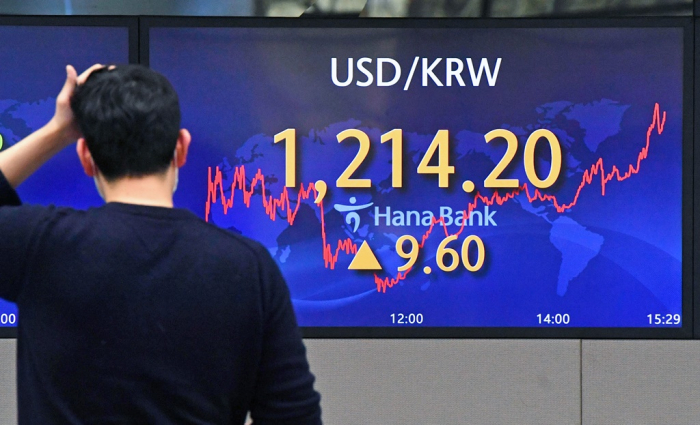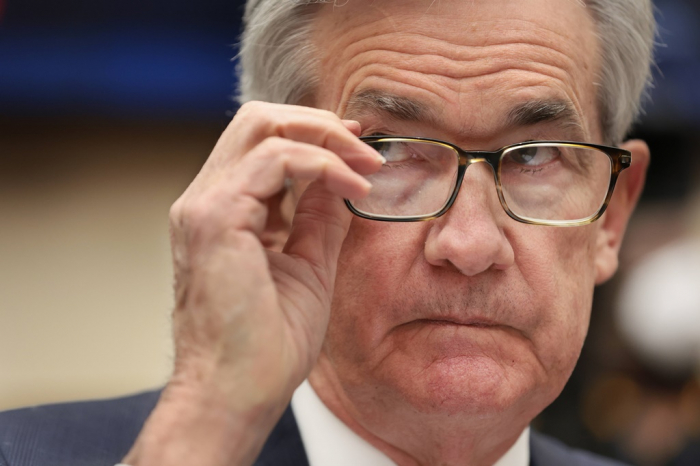Foreign exchange
Korean won nears 2-year low, adds to inflation woes
Consumer prices up 3.7% in Feb, slightly lower than a decade high marked in Nov; govt to extend tax cuts for oil products
By Mar 04, 2022 (Gmt+09:00)
3
Min read
Most Read
LG Chem to sell water filter business to Glenwood PE for $692 million


KT&G eyes overseas M&A after rejecting activist fund's offer


Mirae Asset to be named Korea Post’s core real estate fund operator


StockX in merger talks with Naver’s online reseller Kream


Meritz backs half of ex-manager’s $210 mn hedge fund



The South Korean won currency tumbled to its lowest point in almost two years on Friday, adding to inflationary pressure in Asia’s fourth-largest economy, while Russia's attack on the largest nuclear power plant in Ukraine dented risk sentiment.
South Korea’s consumer inflation hovered near a decade high last month amid surging oil prices amid the Russia-Ukraine war, prompting the government to seek measures to cool down the rise in prices.
The won lost 0.8% to close the domestic foreign exchange market at 1,214.2 against the dollar, its weakest since June 22, 2020.
Investors shunned riskier assets such as stocks on the intensifying military conflict in the Eastern European country. South Korean stocks lost ground with the main Kospi down 1.22% and the junior Kosdaq falling 1.25%, respectively. Foreign investors sold a net 589 billion won ($484.4 million) in stock on the main bourse. Japan’s Nikkei index closed down 2.23%.
WON TO SOFTEN FURTHER ON FED TIGHTENING
Sentiment soured further as the US Federal Reserve reiterated its plan of interest rate hikes and quantitative tightening to reduce liquidity despite the Russia-Ukraine crisis. Fed Chair Jerome Powell said on March 2 that for now, the central bank was proceeding largely as planned to raise the target overnight federal funds rate and reduce the size of its balance sheet in order to tame inflation.

The Bank of Korea predicted the Fed to mention details on the quantitative tightening such as the size per month during its policy meetings on March 15-16 or May 3-4. Such a tighter monetary policy, along with higher interest rates, are expected to raise US Treasury yields, driving global funds to the country’s assets and boosting the dollar.
The won is likely to soften to 1,230 versus the US currency and further to 1,250 briefly, analysts said.
“Since the dollar/won broke above a resistance line of 1,210, the exchange rate is expected to head to 1,230 soon,” said Woori Bank economist Min Kyung-won.
INFLATION AROUND DECADE HIGH
The won’s weakness is predicted to increase upward pressure on inflation that was near a 10-year high last month.
Consumer prices rose 3.7% from a year earlier, government data showed, a notch below the decade high of 3.8% logged in November 2021. The BOK forecast inflation at 3.1% this year, the highest since 2011 when consumer prices surged 4%.
The cost of petroleum products surged 19.4% with prices of liquefied petroleum gas for transportation up 23.8%. Gasoline and diesel prices also jumped 16.5% and 21%, respectively.
Headline inflation may rise to 4-5% if the war between Russia and Ukraine lasts long, pushing up raw materials such as oil further. Brent crude futures, the global benchmark, climbed to almost $120 a barrel earlier this week.
TO EXTEND TAX CUTS IN OIL PRODUCTS
To ease the impact of surging oil prices, South Korea plans to extend the 20% tax cut in oil products by three months to the end-July, Finance Minister Hong Nam-ki said.
The ministry will consider wider tax cuts if further hikes in oil prices intensify economic uncertainties, Hong said. The authority was reportedly set to mull a 25% or 30% reduction since the country’s law limits slashes to 30%.
In addition, the government is seeking to temporarily lower taxes under the quota tariff system on noble gases such as neon and krypton, core materials used in semiconductor production. Ukraine suspended production of the rare gases after Russia’s invasion. Ukraine supplies 70% of neon and 40% of krypton to the global market. South Korea is home to the world’s top two memory chipmakers – Samsung Electronics Co. and SK Hynix Inc.
“We are also actively securing additional volumes through diversifications of suppliers and obtaining alternative items,” Hong said.
Write to Ik-Hwan Kim and So-Hyeon Kim at lovepen@hankyung.com
Jongwoo Cheon edited this article.
More to Read
-

-
 EconomyBOK sees inflation at 11-year high as oil tops $100 on Ukraine crisis
EconomyBOK sees inflation at 11-year high as oil tops $100 on Ukraine crisisFeb 24, 2022 (Gmt+09:00)
3 Min read -
 Banking & FinanceBOK’s mission impossible: To lower both inflation and govt bond yields
Banking & FinanceBOK’s mission impossible: To lower both inflation and govt bond yieldsFeb 15, 2022 (Gmt+09:00)
3 Min read
Comment 0
LOG IN


